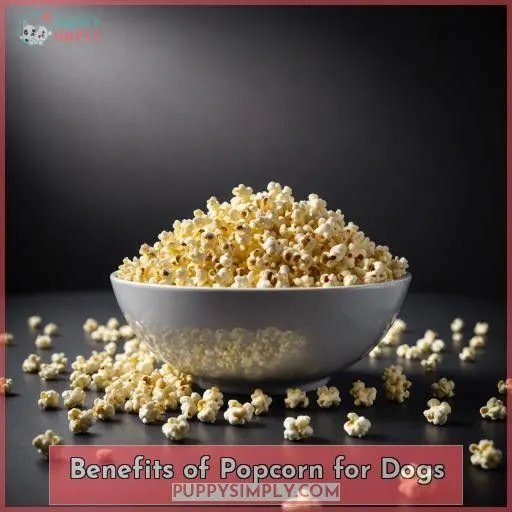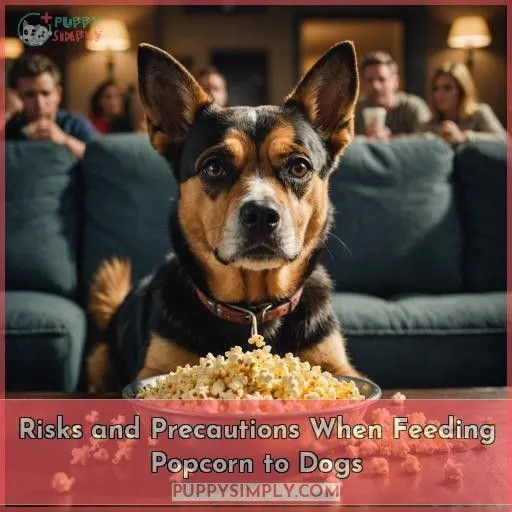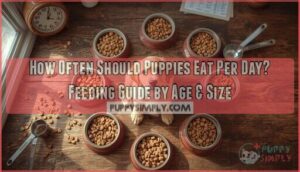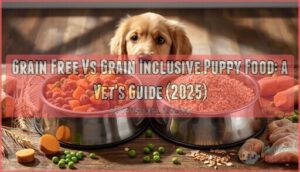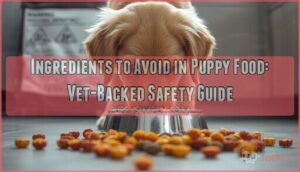This site is supported by our readers. We may earn a commission, at no cost to you, if you purchase through links.
Yes, dogs can enjoy popcorn as an occasional treat, but you’ll need to take some precautions. Stick to plain, air-popped popcorn without any butter, salt, or seasonings, which can cause digestive issues. Be mindful of portion sizes based on your dog’s size, and limit popcorn to no more than 10% of their daily calorie intake.
Avoid giving dogs unpopped kernels, as they pose a choking hazard. You’ll also want to watch for any signs of food allergies. If you follow these guidelines, popcorn can be a fun, low-calorie snack for your pup.
Table Of Contents
Key Takeaways
- Plain, air-popped popcorn can be a safe and low-calorie treat for dogs in moderation.
- Avoid giving dogs buttered, salted, or seasoned popcorn, as it can cause digestive issues and choking hazards.
- Keep portion sizes appropriate for your dog’s size, and ensure treats do not exceed 10% of their daily calorie intake.
- Monitor your dog for signs of food allergies or sensitivities when introducing popcorn into their diet.
Can Dogs Have Popcorn?
Yes, dogs can have popcorn, but it should be plain, air-popped without butter, oil, salt, or chemical spices to avoid potential health issues. Popcorn should be given in moderation and not replace a balanced dog food.
Is Popcorn Safe for Dogs?
Popcorn can be a harmless, low-calorie, and low-fat snack option for dogs. However, it’s imperative to reflect on the hazards. Unseasoned, air-popped popcorn is generally harmless in moderation.
Dogs shouldn’t eat buttered, seasoned, or microwave popcorn, which can cause digestive upset, choking hazards, and dental concerns. Keep whole or partially popped kernels away from dogs, as they can pose a choking hazard.
Always reflect on your dog’s size when determining the appropriate portion size, and remember that treats should constitute only 10% or less of a dog’s daily calorie intake.
Benefits of Popcorn for Dogs
Popcorn can be a healthy, low-calorie snack option for dogs when fed in moderation. Treating your pup to some air-popped popcorn during movie night can even help them maintain a healthy weight.
Low-calorie and Low-fat Snack Option
Popcorn is a low-calorie and low-fat snack option for your pup, making it a perfect addition to your movie night lineup. The high-fiber content in popcorn can benefit your dog’s digestive health, and proper portion control guarantees you’re not overfeeding your furry friend.
Air-popping is the safest method for preparing popcorn, and it’s a fun and healthy treat for your puppy. Just remember to keep the portions small and avoid adding butter or other seasonings that can upset your dog’s stomach.
Potential Weight Loss Benefits
Popcorn, with its high fiber content, can be a paw-some ally in your dog’s weight loss journey. This occasional treat, when unseasoned and given in moderation, supports digestive health without tipping the calorie scale. Remember, portion control is key. So, next time you’re popping for yourself, a little unseasoned share for your furry friend can make a big difference.
Treat for Movie Nights With the Pup
Popcorn can be a nutritious snack for your pup, especially when air-popped and consumed in moderation. It’s a low-calorie, low-fat option that can be a fun treat for movie nights.
However, it’s essential to practice portion control and supervise consumption to avoid digestive issues. Remember, popcorn isn’t a substitute for a balanced diet, so make sure your pup is well-hydrated and getting the necessary nutrients from their regular meals.
Risks and Precautions When Feeding Popcorn to Dogs
While plain, air-popped popcorn in moderation can be a safe treat for dogs, buttered or seasoned popcorn poses serious health risks. It’s also essential to pay attention to choking hazards from unpopped kernels and potential dental issues, and be aware of any food allergies your dog may have.
Risks of Buttered and Seasoned Popcorn
Popcorn is a popular snack for movie nights, but it’s necessary to think about the risks when sharing it with your pup. While plain, air-popped popcorn can be a relatively safe and low-calorie treat for dogs, it’s important to stay away from buttered and seasoned popcorn because of their high fat content and potential for salt toxicity. Here are some key points to keep in mind:
- High Fat Content: Butter is high in fat and can contribute to weight gain and pancreatitis in dogs.
- Salt Toxicity: Too much salt can lead to sodium ion poisoning, causing symptoms like vomiting, diarrhea, increased thirst, excessive urination, and even seizures.
- Artificial Additives: Many commercially available popcorn brands offer flavored varieties with artificial ingredients, sugar, or xylitol, which can be toxic to dogs.
- Choking Hazards: Unpopped kernels, or old maids, can pose a serious choking hazard to dogs.
- Dental Health: Unpopped kernels can also cause dental damage if bitten into forcefully.
When feeding popcorn to your dog, it’s important to follow these guidelines:
- Air-Popping: Use an air popper to make sure the popcorn is fully popped and free from unpopped kernels.
- Portion Control: Be aware of your dog’s size and feed appropriate portions to prevent potential health risks.
- Moderation: Treats should make up 10% or less of a dog’s daily calorie intake.
- No Additives: Avoid buttered, salted, or flavored popcorn, as well as microwave popcorn, which often contains harmful chemicals and can cause digestive upset.
Choking Hazards and Dental Concerns
When evaluating the safety of popcorn for dogs, it’s essential to address the potential choking dangers and dental worries. Unpopped kernels can pose a choking threat, so it’s vital to guarantee that your pup is only eating fully popped corn.
Additionally, the firm texture of popcorn can add to dental health issues. To minimize these risks, stick to air-popped popcorn and offer it as an occasional delight, keeping in mind that dental health is a key component of puppy nutrition.
Food Allergies and Popcorn
Dogs can experience food allergies, just like humans. Allergic reactions can manifest in various ways, including itching and skin irritation, digestive issues, and even respiratory distress. While popcorn isn’t a common allergen, it’s still essential to exercise caution when introducing new foods to your dog’s diet.
Here are three key points to keep in mind regarding food allergies and popcorn:
- Allergy Prevention: To prevent allergic reactions, always consult with your veterinarian before introducing new foods to your dog’s diet. They can provide guidance on how to introduce popcorn safely and monitor your dog for any adverse reactions.
- Symptom Management: If you suspect your dog has a food allergy, observe for symptoms such as itching, skin irritation, digestive issues, or respiratory distress. If these symptoms occur, consult with your veterinarian for proper diagnosis and treatment.
- Food Sensitivity and Hypoallergenic Diets: Dogs can develop food sensitivities, which may not involve an immediate immune reaction but can still cause discomfort. If your dog experiences gastrointestinal issues, skin problems, or other symptoms after eating popcorn, consider switching to a hypoallergenic diet that excludes corn and other common allergens.
Frequently Asked Questions (FAQs)
What are the potential benefits of feeding popcorn to dogs?
Well, dog-gone it, popcorn’s a pawsome low-calorie snack that packs a punch of fiber! Just be sure to stick to the plain stuff – no butter or salt for your furry friend.
How can I prepare popcorn for my dog safely?
You can safely prepare popcorn for your pup by air-popping it without any added oils or seasonings. Stick to small portions and monitor your dog to prevent choking on unpopped kernels. A little popcorn makes a fun, occasional treat!
What are the risks associated with feeding popcorn to dogs?
Tread carefully, my friend, for popcorn’s salty shores can be a minefield for your pup. Steer clear of buttered and seasoned varieties – they’re a recipe for digestive distress. Stick to the air-popped stuff, but in moderation, as even a good thing can be too much.
How much popcorn can dogs safely consume?
You can give your dog small amounts of plain, air-popped popcorn as an occasional treat, but stick to no more than 10% of their daily calorie intake. Avoid buttered, seasoned, or microwave popcorn which can upset their tummy.
What are some healthier alternatives to popcorn for dogs?
You can offer your pup some healthier alternatives like plain, unsalted cooked veggies, plain baked chicken, or even special dog treats formulated for their nutritional needs. These make great low-calorie, low-fat snacks that won’t upset their tummy.
Conclusion
Certainly, when you’re snuggled up for a movie night with your canine companion, can dogs have popcorn as a delightful treat.
However, to make sure your pup’s safety and well-being, you’ll want to stick to plain, air-popped popcorn without any butter, salt, or seasonings. Moderation is key, limiting popcorn to no more than 10% of their daily caloric intake.
By following these precautions, you can enjoy this low-calorie snack together, creating cherished memories and a happier, healthier pup.



